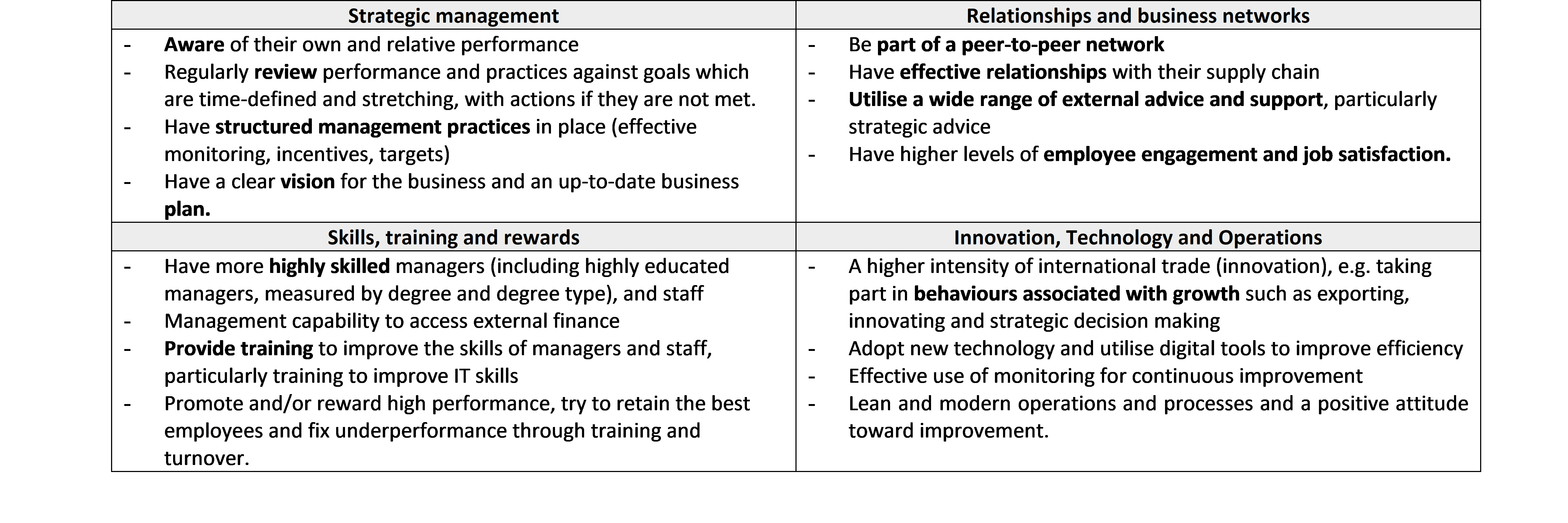Returning to growth: the role of management practices in productivity
Enabling economic recovery in a post covid-19 world is a key challenge recognised by policymakers, business groups and academic researchers. Finding ways to increase firm-level productivity will therefore become even more important than before. Even before the crisis caused by covid-19 there were many possible explanations for the long-standing weakness of productivity in the economy at large and within firms, with no single factor explaining the entire puzzle.
About the research
University of Bristol research carried out before the pandemic began has sought to provide a better understanding of how decisionmakers understand, and therefore act upon, factors believed to be affecting their firms’ productivity. This briefing summarises research into productivity practices in the manufacturing sector and within firms in the West of England region, aiming to increase the depth of our understanding of the management and leadership drivers of productivity at the firm level, while being attentive to regional divergences.
Policy Implications
• For businesses, steps towards enhanced productivity include accessing support to improve management and leadership skills and capabilities, as well as engaging with opportunities for technology adoption and diffusion.
• For industry support organisations, a common language of productivity that articulates common goals between firms (at micro-economic level), sector specialists (at meso-economic level) and policymakers (at macro-economic level) needs to be developed.
• For policymakers, successfully encouraging businesses to improve their productivity requires clearly articulating the benefits and overcoming management and leadership inertia to allow for innovation. This implies a concerted effort to deliver services through new channels to build trust, including through peer-to-peer networks, existing professional service relationships, and targeting support around key events in the life of businesses.
• For academics, to better understand productivity growth academics from a range of disciplines must consider other factors such as regional differences, market competition, inward investment, sectorspecific strengths and institutional level drivers such as tax regimes. This raises more complex research questions which demand a more inclusive and pluralistic approach to academic inquiry and different levels of analysis (micro, meso and macro) to model and measure productivity.
Key Findings
• Among businesses, understandings of productivity vary widely, and it is important to develop a nuanced understanding of the business environment in different industries and places.
• Characteristics of effective management and leadership practices found in high productivity businesses relate to employee decision-making and effort, good strategic leadership, investing in skills development, and higher levels of exporting, innovating and continuous improvement. Moreover, the ability of managers and leaders to embrace and adapt to new technology, engage in innovation, and address processes and elements appears to be an important factor.
• Improved support services might benefit firms, increasing the ‘diffusion’ of best practice and equipping businesses with the necessary tools to become more productive. However, barriers to the uptake of support services include doubts over the benefits and value of support versus the cost, relationship failure due to a lack of trust in support bodies and concerns over the appropriateness of the assistance.
• New and alternative approaches that may incentivise desirable behaviours include relationship building, information sharing and supported learning. Policy interventions face the challenge that lower levels of management and leadership capability are associated with lower levels of productivity. Thus, the challenge is compounded by a lack of firm-level desire to tackle productivity head-on.

Figure 1: Literature-based overview of characteristics found in high productivity businesses relating to good management and leadership.
Further Information
MacBryde et al. (2019). Unpicking the productivity narrative in UK manufacturers.
Burger, K., Pitts, H., Risk, J. (2019). Understanding Productivity Practices: a Review Report
Acknowledgement: We would like to thank James Risk, who has acted as a research assistant on this project.
Funding: The research reported in this briefing note is based on a UK-wide study focused on the manufacturing sector (ESRC ES/R007810/1, Prof Palie Smart) and a more specific study focused on the West of England Combined Authority (WECA) region (ESRC IAA ES/M500410/1, Dr Katharina Burger and Dr Harry Pitts).
Authors
Dr Katharina Burger, Dr Harry Pitts and Prof Palie Smart, The University of Bristol School of Management George Margesson, West of England Local Enterprise Partnership*
*George Margesson assisted in considering the relevance of the research to the challenges posed in the region’s Local Industrial Strategy. The views expressed in this briefing do not necessarily reflect the policy position of the West of England Combined Authority or Local Enterprise Partnership.
